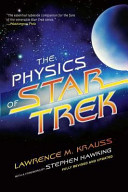Science Fiction and Science as a Two-Way Street
Science fiction like Star Trek is not only good fun but it also serves a serious purpose, that of expanding the human imagination. We may not yet be able to boldly go where no man (or woman) has gone before, but at least we can do it in the mind. We can explore how the human spirit might respond to future developments in science and we can speculate on what those developments might be. There is a two-way trade between science fiction and science. Science fiction suggests ideas that scientists incorporate into their theories, but sometimes science turns up notions that are stranger than any science fiction. Black holes are an example, greatly assisted by the inspired name that the physicist John Archibald Wheeler gave them. Had they continued with their original names of “frozen stars” or “gravitationally completely collapsed objects,” there wouldn't have been half so much written about them.
...today's science fiction is often tomorrow's science fact. The physics that underlies Star Trek is surely worth investigating. To confine our attention to terrestrial matters would be to limit the human spirit.
Notes:
Hawking observes that SF inspires science, but science often turns up things that are stranger than fiction.
Folksonomies: science science fiction sf
Taxonomies:
/art and entertainment/books and literature/science fiction (0.623392)
/science (0.619749)
/law, govt and politics/legal issues/human rights (0.377675)
Keywords:
science fiction (0.901069 (positive:0.240670)), Two-Way Street Hawking (0.739051 (neutral:0.000000)), SF inspires science (0.725038 (neutral:0.000000)), Star Trek (0.703723 (neutral:0.000000)), physicist John Archibald (0.661751 (positive:0.349495)), human spirit (0.649722 (negative:-0.011151)), good fun (0.520495 (neutral:0.000000)), human imagination (0.512335 (positive:0.457326)), two-way trade (0.508666 (positive:0.240670)), Black holes (0.492384 (neutral:0.000000)), worth investigating (0.492018 (neutral:0.000000)), terrestrial matters (0.490363 (negative:-0.356653)), future developments (0.489827 (positive:0.345502)), original names (0.487013 (neutral:0.000000)), science fact (0.476346 (neutral:0.000000)), stranger (0.418927 (negative:-0.222326)), notions (0.345052 (neutral:0.000000)), Wheeler (0.341790 (positive:0.349495)), things (0.340275 (negative:-0.222326)), purpose (0.339524 (neutral:0.000000)), woman (0.337689 (neutral:0.000000)), mind (0.337445 (negative:-0.504909)), attention (0.335481 (negative:-0.356653)), theories (0.335015 (neutral:0.000000)), ideas (0.334671 (neutral:0.000000)), scientists (0.334638 (neutral:0.000000)), example (0.334619 (neutral:0.000000))
Entities:
Science Fiction and Science:PrintMedia (0.928066 (neutral:0.000000)), John Archibald Wheeler:Person (0.093314 (positive:0.349495)), Hawking:Person (0.085573 (neutral:0.000000)), Black holes:FieldTerminology (0.077091 (neutral:0.000000)), physicist:JobTitle (0.070973 (positive:0.349495))
Concepts:
Science (0.979516): dbpedia | freebase | opencyc
Physics (0.847633): dbpedia | freebase | opencyc
General relativity (0.788891): dbpedia | freebase | opencyc
Black hole (0.780225): dbpedia | freebase | opencyc
Scientific method (0.743659): dbpedia | freebase
Science fiction (0.704438): dbpedia | freebase
Wormhole (0.679454): dbpedia | freebase
John Archibald Wheeler (0.673617): dbpedia | freebase | yago






